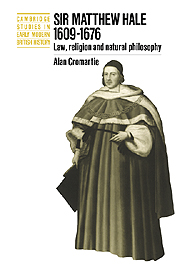9 - Hale's ‘puritanism’
Published online by Cambridge University Press: 05 May 2010
Summary
Hale struck his own contemporaries as ‘godly’, on excellent, if superficial, grounds; he spoke deliberately and dressed in black. There are hints that the more rigorous had doubts, but competent observers were won over. Thus Major-General Whalley said, in 1656, that ‘as he is an able, so upon good grounds I judge him a godly man’, and Richard Baxter stressed, with the same implicit criticism in mind, that so far from being a ‘righteous moral man’, he was a paragon of true religion. His sympathy with puritans undoubtedly ran deep; he was prepared to see religious feeling where others saw ‘enthusiasts’ and knaves, their cloak of irrationalist folly concealing seditious intent. Intellectually, however, he had much more in common with a very different group, with ‘moral men’ of younger generations who were hostile to subjective validations of the faith.
The problem Hale exemplifies is that of ‘latitudinarian’ religion. Most Restoration Anglicans had broken with the orthodoxy of the recent past, and were happy to associate all Calvinist beliefs with the supposed excesses of an antinomian fringe. Such attitudes were not at all surprising in high episcopalians on the church's Laudian wing. The latitudinarians, by contrast, arrived at the same convictions by a rather different route. They shared the anti-Calvinism of the heirs of Laud, and their suspicion of enthusiasts, but not their sacramental piety, still less their emphasis on rule by bishops, except as a convenient means of governing the church.
- Type
- Chapter
- Information
- Sir Matthew Hale, 1609–1676Law, Religion and Natural Philosophy, pp. 139 - 155Publisher: Cambridge University PressPrint publication year: 1995
- 1
- Cited by



